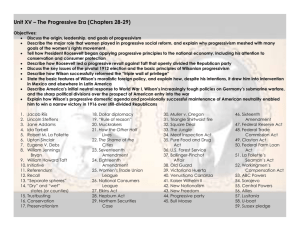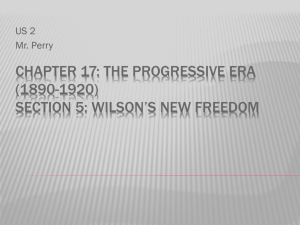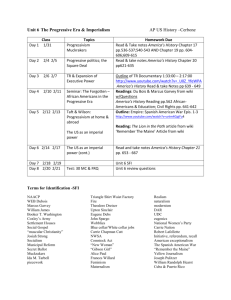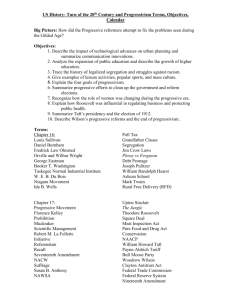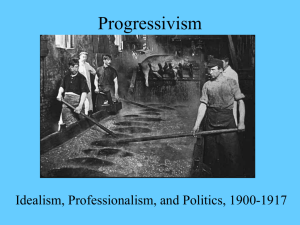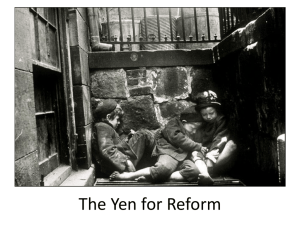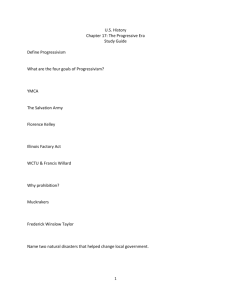The Progressive Era
advertisement
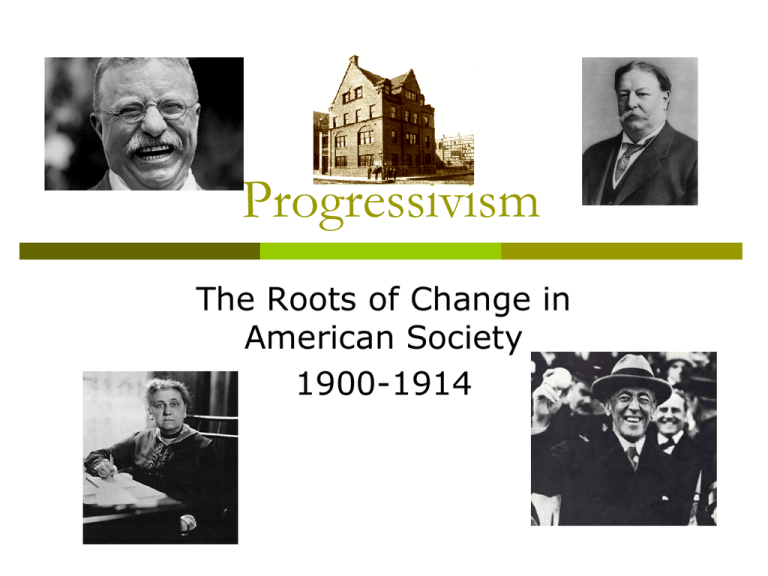
Progressivism The Roots of Change in American Society 1900-1914 Progressivism & the Protestant Spirit Progressive ideals strong amongst young, Protestant, middle class Americans. SOCIAL GOSPEL MOVEMENT Three smaller groups of reformers: A) Muckrakers B) settlement house founders C) socialists Four Goals of the Progressive Movement Protecting Social Welfare Promoting Moral Improvement Reformers believed that morality was the key to improving the lives of workers & immigrants. Prohibition & WCTU Creating Economic Reform Reform urban problems YMCA, Salvation Army, Illinois Factory Act Sought to change the economic system full of struggling immigrants Thoughts of Socialism & Eugene Debs Fostering Efficiency Exposing the Evils: Muckrakers, Magazines, & Realism Investigative journalism : Monopolies & Rockefeller Bribery in government Rise of Prostitution and social evils Boss Tweed & Tammany Hall Jane Addams & Hull House Established first settlement house in on South Halstead in Chicago Former Chicago Black Hawk great Bobby Hull. Hull House- located in Chicago. Coincidence? You be the judge! Hull House, Chicago, IL What purpose/services did it serve? Eliminate prostitution Day care Taught banking, language classes Employment bureau Promote temperance The Political Impact of Progressivism: Municipal & State Reforms A. Municipal (Local) Reforms Public Utilities – gas, telephones, water, trolley companies) Brought about two new systems of government City Commission Plan Power shifted from mayor (1) to a group of city commissioners/ councilors/aldermen City Manager Plan City manager, city council, mayor The Political Impact of Progressivism: State Reforms Robert LaFollette (Wisconsin) – “Battling Bob” Power to the People Initiative- bill originates with the citizens, not the Referendum- allows voters to reject and accept Recall – citizens have the ability to remove public officials – accountability factor Direct Election of Senators – 17th Amendments lawmaker initiative Theodore Roosevelt “If you could kick the person in the pants responsible for most of your trouble, you wouldn't sit for a month.” - TR Rise to Power Family History Childhood obstacles, a fine education Teddy Bear cowboy Political Resume 3 terms in NY State Assembly Tammany Hall N.Y. City Police Commissioner Asst. Secretary of Navy Rough Riding President – American Hero N.Y. Governor Vice President of the U.S. (McKinley) “Character, in the long run, is the decisive factor in the life of an individual and of nations alike” - TR The Square Deal “Any man who is good enough to shed his blood for his country, is good enough to be given a square deal” Trust-Busting Interstate Commerce Act (1887) Northern Securities Case Sherman Anti-Trust Act Helping the Workers 1902 Coal Strike Workers win (sort of) – recognition of arbitration Improving the Economy “Not all trusts are bad Interstate Commerce Commission Hepburn Act -1906 Protecting America’s Health The Jungle by Upton Sinclair Meat Inspection Act of 1906 Truth in Labeling Law Pure Food & Drug Act Supreme Court Rulings: Lochner v. New York (1905) Constitutional Issue/Question: Was New York’s Bake Shop Act, in violation of the 14th Amendment-What is the 14th Amendment? Decision: laws limiting the number of hours an employee is required to work interferes with the 14th Amendment. baking is not an unhealthy trade and the law limiting hours cannot be justified as a legitimate exercise of police power to protect health and safety. Impact: After the Supreme Court decision a 32 year period called the Lochner era began. Child labor laws and minimum wages were invalidated in the name of Lochner The union bakers eventually won shorter working days through collective bargaining Supreme Court Rulings: Muller v. Oregon (1908) Constitutional Issue/Question: Decision: Was Portland, Oregon justified when they fined Curt Muller for requiring one of his female employees to work over 10 hours for one day? state may limit the hours a woman can work may also use their police power and their responsibility to protect the health of citizens to enact laws laws may interfere with contract and property rights. Impact: The progressive legislation of treating women differently is now viewed to be so constitutionally suspect it would not be allowed to stand. In further cases laws that gave men favorable treatment were struck down, and would be scrutinized under the 14th Amendment (the right for an individual to make contracts). The Taft Presidency Insert fat jokes here The Taft Presidency – Progressive or Regressive? The Payne-Aldrich Tariff Ballinger-Pinchot Affair Split the Republican party The Republican Party & President William H. Taft The Progressive Party & Former President Theodore Roosevelt People should rise above their sectarian interests to promote the general good. The “Bull Moose” Party: The Latest Arrival at the Political Zoo The Democratic Party & Governor Woodrow Wilson (NJ) Could he rescue the Democratic Party from “Bryanism”?? Election Results By 1912, 100,000 fewer people had voted for Wilson than had voted for Bryan in 1908. The 1912 election marked the highpoint of the Socialist movement in America. The Rise of Woodrow Wilson President of the United States 1912-1920 Advocate of the “Living Constitution” The Wilson Presidency: New Freedom “Wilson believed that the Constitution was not relevant to the needs of a modern industrial society” --------------------------------------------------------------------------------------- Underwood Tariff of 1913 16th Amendment –(1913) Authorizes a federal income tax Federal Reserve Act Reduced tariff rates from 40% to 25% Trust industries were targeted to foster competition and reduce rates Loss of revenue??? Made up how???? Strengthened the banking system by creating a central banking system A return to the Bank of the United States Delegated financial functions to 12 district reserve banks Placed a measure of restraint on Wall Street 17th Amendment – (1913) Establishes direct election of senators The Wilson Presidency: New Freedom (Continued) Clayton Antitrust Act of 1914 Definition of illegal practices was flexible, whether or not a action stifled competition or created a monopoly Received broad power to investigate companies unfair trade practices Designed to promote consumer protection Could issue “cease and desist” orders Other Progressive Reforms unions Federal Trade Commission Amended the Sherman Anti-trust Act – Could not be used against Federal child labor law Adamson eight-hour law for railroad workers Seamen’s Act, eliminated age-old abuses of sailors aboard ships Federal Farm Loan Act Blacks largely left out of Wilson’s Progressivism
